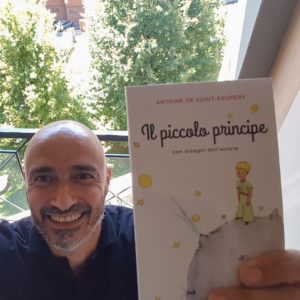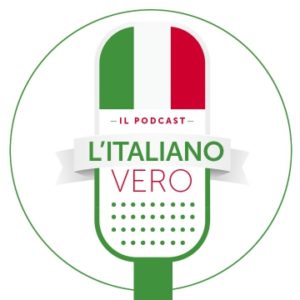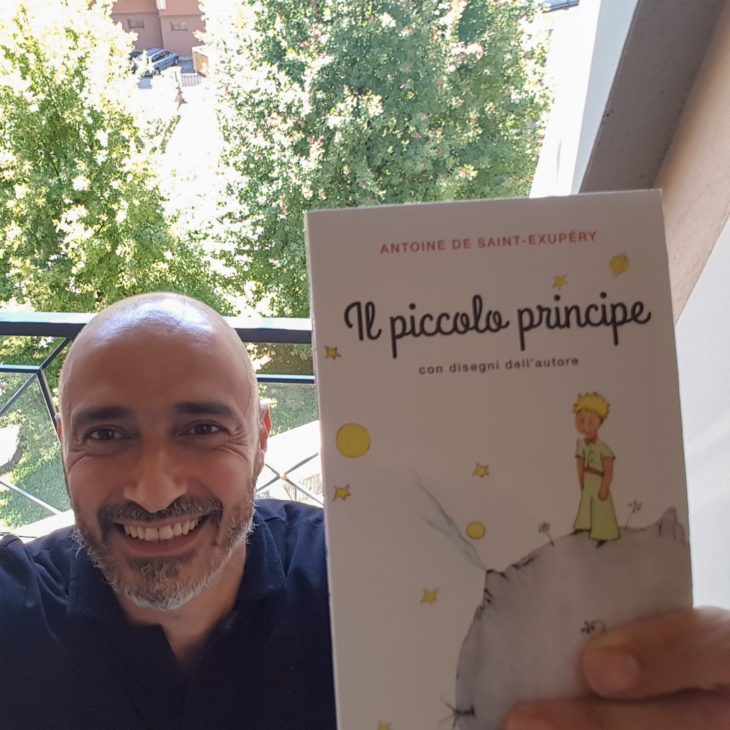
Blog in italiano – tempo di lettura: 4 min
Blog in English – reading time: 5 min
________________
Blog in italiano
Un grande ciao dai vostri Italiani Veri!
Vogliamo fare un saluto particolare al nuovo patron Pavlo, a Costanza di “RedLearnItalian” che ha consigliato su Instagram il nostro podcast tra quelli da ascoltare, a Olga e Baustein9 che ci hanno lasciato una bella recensione su Apple podcast!
Grazie a tutti!
Nuova settimana, nuovi argomenti di cui chiacchierare a tre voci, visto che Paolo è di nuovo tra noi!
29 giugno
In Italia, il 29 giugno è la festa liturgica in onore del martirio dei santi Pietro e Paolo, due santi importanti della cristianità. Fino al 1976, era giorno festivo concordatario, ma la festività è stata abrogata nel marzo 1977, rimanendo solo come festa patronale per la città di Roma e di diversi altri comuni italiani.
Il 29 giugno del 1900 nasce Antoine de Saint-Exupéry: scrittore e pilota aeronautico francese, famoso autore de Il Piccolo Principe, pubblicato nel 1943, che lo consacra scrittore davanti al mondo intero. Il libro, diventato subito un grande successo, con oltre 250 traduzioni in tutto il mondo, è tra le opere letterarie più celebri. Le sue opere sono l’esaltazione del senso del dovere, dell’amore per la vita, della capacità di affrontare la morte. Quella di de Saint-Exupéry è una letteratura di eroismo, di sublimazione dell’amicizia e di fratellanza. Nel luglio del 1944 si alza in volo per l’ultima volta, probabilmente abbattuto dall’aviazione tedesca (Luftwaffe).
4 luglio
Nel 1807 nasce Giuseppe Garibaldi: Le cronache storiche lo citano come eroe dei due mondi, generale e condottiero di imprese militari compiute sia in Europa che in America meridionale. Nelle memorie italiane è celebrato quale principale protagonista del Risorgimento, ricordato in numerose vie e piazze della Penisola.
Nato a Nizza (fino al 1860 nel Regno sabaudo, oggi in Francia) e morto a Caprera nel 1882, in stretto contatto con i mazziniani, partecipò ai moti di Genova, alla Seconda guerra d’Indipendenza come generale dell’Esercito piemontese e organizzò la famosa Spedizione dei Mille. Partecipò alla Terza guerra d’Indipendenza e alla guerra Franco-Prussiana a fianco dei francesi.
5 luglio
Ai Mondiali di Spagna ‘82, l’Italia elimina il Brasile: Il Mondiale di calcio di Spagna ’82 ha una formula con due fasi a gironi, semifinali e finali. La Nazionale italiana supera il primo girone, classificandosi al secondo posto dietro la Polonia, con tre pareggi (le altre squadre sono Perù e Camerun): un inizio certamente non esaltante. Nella seconda fase a gruppi, l’Italia è con l’Argentina e il Brasile. Il 29 giugno gli azzurri, con i gol di Tardelli e Cabrini, piegano per 2 a 1 l’Argentina, campione del mondo in carica. L’ultimo ostacolo verso la semifinale è il Brasile, vittorioso contro gli argentini e da tutti considerato favorito per la vittoria finale. Il valore della sfida del 5 luglio 1982 è altissimo e l’Italia si qualifica solo con la vittoria.
La Nazionale verdeoro scende in campo con una delle migliori formazioni della sua storia: Zico, Eder, Cerezo, Falcao e Socrates su tutti. Gli azzurri schierano calciatori che entreranno nella storia del calcio italiano.
La partita ha un’altalena di gol che alla fine premia gli italiani per 3 a 2, con una tripletta di Paolo Rossi (poi soprannominato “Pablito”) e con le reti, per i brasiliani, di Socrates e Falcao.
Il 5 luglio del 1946 nasce il bikini: nel 1946, lo stilista francese Louis Reard, presentò a Parigi un nuovo costume da bagno femminile a due pezzi, il bikini appunto che avrebbe non solo rivoluzionato la moda, ma anche dato un contributo alla crescente voglia di libertà delle donne. Quell’anno gli Stati Uniti fecero esplodere nel Pacifico, sull’atollo di Bikini (isole Marshall), alcuni ordigni nucleari. Poiché l’introduzione del nuovo costume fece tanto scalpore quanto le esplosioni delle bombe all’idrogeno, gli stilisti gli diedero il nome dell’atollo.
In realtà il due pezzi ha origini lontane, sono stati ritrovati affreschi che testimoniano che già in epoca romana si usava una sorta di bikini, non per prendere il sole ma per fare ginnastica o danzare…
Corsi e ricorsi della moda!

Contribuirono alla diffusione del bikini, a partire dalla seconda metà degli anni Cinquanta. le grandi star del cinema come Brigitte Bardot o Ursula Andress, nei panni di bond girl, e i concorsi di bellezza come Miss Italia con le nostre Lucia Bosè e Gina Lollobrigida di cui ricordiamo anche l’anniversario della nascita il 4 luglio del 1927.
In foto un felice Massimo con il regalo del “Piccolo Principe” appena ricevuto da Sara come promesso durante l’episodio
By Sara
►Ti piace il nostro podcast? sostienici al costo di un caffè
senza di voi non ci sarebbe il podcast:
https://www.patreon.com/litalianoveropodcast
►Contattaci per idee su nuovi episodi:
https://www.litalianovero.it/wp/contatti/
►Facebook:
https://www.facebook.com/litalianoveropodcast/
►Instagram:
https://www.instagram.com/litalianoveropodcast/
►YouTube
https://bit.ly/2zvrbOK
Blog in Inglese
Week no. 27 from June 29th to July 5th
A big hello from your Italiani Veri!
We want to give a special greeting to the new patron Pavlo, to Costanza of “RedlearnItalian” who recommended our podcast on Instagram to listen to, to Olga and Baustein9 who left us a nice review on Apple podcast!
Thank you all!
New week, new topics to chat in three voices, since Paolo is back among us!
June 29
In Italy, June 29 is the liturgical feast in honor of the martyrdom of Saints Peter and Paul, two important saints of Christianity. Until 1976, it was a bank holidaybank holiday, but the holiday was repealed in March 1977, remaining only as a patronal feast for the city of Rome and several other Italian municipalities.
On 29 June 1900 Antoine de Saint-Exupéry was born: French writer and aeronautical pilot, famous author of The Little Prince, published in 1943, who consecrated him as a writer in front of the whole world. The book, which immediately became a great success, with over 250 translations worldwide, is among the most famous literary works. His works are the exaltation of the sense of duty, of love of life, of the ability to face death. De Saint-Exupéry’s is a literature of heroism, of the sublimation of friendship and of brotherhood. In July 1944, he took off for the last time, probably shot down by the German air force (Luftwaffe).
July 4th
Giuseppe Garibaldi was born in 1807: The historical chronicles cite him as a hero of the two worlds, general and leader of military enterprises carried out both in Europe and in South America. In Italian memories he is celebrated as the main protagonist of the Risorgimento (the Resurgence), remembered in numerous streets and squares of the Peninsula. Born in Nice (until 1860, part of the Savoy Kingdom, now in France) and died in Caprera in 1882, in close contact with the Mazzinians, he participated in the uprisings of Genoa, in the Second War of Independence as general of the Piedmontese Army and organized the famous Spedizione dei Mille (Expedition of the Thousand). He participated in the Third War of Independence and the Franco-Prussian War alongside the French.
July 5
Mondiali di Spagna ‘82: l’Italia elimina il Brasile 1982 (At the ’82 FIFA World Cup in Spain, Italy eliminates Brazil): The ’82 Spain World Cup has a formula with two group stages, semifinals and finals. The Italian national team surpasses the first group, ranking second behind Poland, with three draws (the other teams are Peru and Cameroon): a start certainly not exciting. In the second group stage, Italy is with Argentina and Brazil. On 29 June the Azzurri, with goals from Tardelli and Cabrini, beat Argentina, the reigning world champion, by 2 to 1. The last obstacle towards the semifinal is Brazil, victorious against the Argentinians and considered by everyone to be the favorite for the final victory. The value of the challenge of 5 July 1982 is very high and Italy qualifies only with the victory. The “Verdeoro” (green and gold) national team takes the field with one of the best teams in its history: Zico, Eder, Cerezo, Falcao and Socrates above all. “Azzurri” line up players who will enter the history of Italian football. The game has a swing of goals that eventually rewards the Italians 3 to 2, with a hat-trick by Paolo Rossi (later nicknamed “Pablito”) and with the goals, for the Brazilians, of Socrates and Falcao.
On 5 July 1946 there was the birth of the bikini: in 1946, the French designer Louis Reard presented a new two-piece women’s swimsuit in Paris, the bikini that would not only revolutionize fashion, but also give a contribution to women’s growing desire for freedom. That year, the United States detonated some nuclear weapons in the Pacific, on the Bikini atoll (Marshall Islands). Since the introduction of the new costume caused as much sensation as the explosions of hydrogen bombs, the designers gave it the name of the atoll.In reality the two pieces have distant origins, frescoes have been found which testify that already in Roman times a sort of bikini was used, not for sunbathing but for gymnastics or dancing. Cycles and counter cycles of style.

These two actresses contributed to the spread of the bikini, starting from the second half of the fifties: the great movie stars such as Brigitte Bardot or Ursula Andress, in the role of bond girl, and beauty contests like Miss Italia with our Lucia Bosè and Gina Lollobrigida, of whom we also remember the anniversary of her birth on 4 July 1927.
In the episode cover photo is a happy Massimo with the gift of “Little Prince” just received from Sara as promised during the episode.
By Kevin (ItalianRocks)
►Did you like the podcast? Support us at the cost of a coffee
without you there would be no podcast:
https://www.patreon.com/litalianoveropodcast
►Contact us for ideas about new podcasts:
https://www.litalianovero.it/wp/contatti/
►Facebook:
https://www.facebook.com/litalianoveropodcast/
►Instagram:
https://www.instagram.com/litalianoveropodcast/
►YouTube
https://bit.ly/2zvrbOK
 Settembre 9, 2019
Settembre 9, 2019 24 min
24 min Luglio 29, 2019
Luglio 29, 2019 13 min
13 min Luglio 15, 2019
Luglio 15, 2019 24 min
24 min Luglio 1, 2019
Luglio 1, 2019 15 min
15 min Giugno 17, 2019
Giugno 17, 2019 21 min
21 min Maggio 30, 2019
Maggio 30, 2019 29 min
29 min Maggio 9, 2019
Maggio 9, 2019 21 min
21 min Aprile 30, 2019
Aprile 30, 2019 28 min
28 min Aprile 17, 2019
Aprile 17, 2019 15 min
15 min Aprile 10, 2019
Aprile 10, 2019 24 min
24 min Aprile 3, 2019
Aprile 3, 2019 24 min
24 min Gennaio 26, 2020
Gennaio 26, 2020 21 min
21 min Gennaio 12, 2020
Gennaio 12, 2020 20 min
20 min Dicembre 29, 2019
Dicembre 29, 2019 24 min
24 min Dicembre 15, 2019
Dicembre 15, 2019 21 min
21 min Dicembre 1, 2019
Dicembre 1, 2019 12 min
12 min Novembre 17, 2019
Novembre 17, 2019 min
min Novembre 3, 2019
Novembre 3, 2019 20 min
20 min Ottobre 20, 2019
Ottobre 20, 2019 14 min
14 min Ottobre 7, 2019
Ottobre 7, 2019 9 min
9 min Settembre 23, 2019
Settembre 23, 2019 33 min
33 min Gennaio 9, 2024
Gennaio 9, 2024 6 min
6 min Dicembre 2, 2022
Dicembre 2, 2022 31 min
31 min Ottobre 8, 2022
Ottobre 8, 2022 18 min
18 min Dicembre 25, 2021
Dicembre 25, 2021 1 min
1 min Settembre 18, 2021
Settembre 18, 2021 21 min
21 min Agosto 14, 2021
Agosto 14, 2021 17 min
17 min Maggio 4, 2020
Maggio 4, 2020 32 min
32 min Aprile 12, 2020
Aprile 12, 2020 41 min
41 min Agosto 26, 2019
Agosto 26, 2019 18 min
18 min Agosto 12, 2019
Agosto 12, 2019 11 min
11 min Giugno 5, 2019
Giugno 5, 2019 9 min
9 min







Leave a Comment